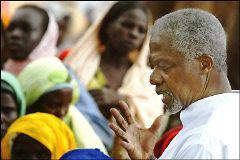UN could organize Darfur troops in 4 months – Annan
May 30, 2006 (UNITED NATIONS) — U.N. Secretary-General Kofi Annan on Tuesday estimated it would take about four months for the United Nations to organize a peacekeeping force in Darfur once the U.N. Security Council gives the green light.
 Sudan has yet to decide whether to allow U.N. troops into Darfur, but will let a U.N. military team visit the region to investigate a U.N. role. That visit is expected next week.
Sudan has yet to decide whether to allow U.N. troops into Darfur, but will let a U.N. military team visit the region to investigate a U.N. role. That visit is expected next week.
“The planning is fairly advanced. We have the framework plan and when we go on to the ground, we will fill in the holes that we have,” Annan told reporters.
“We have made preliminary contacts with governments about potential troop contributions,” Annan said. “The speed with which we deploy will depend on how quickly the governments give us these troops.”
“So we will be looking at a couple of months. By a couple of months, I mean four months or so,” he said.
The 15-nation U.N. Security Council will travel to Sudan next week in an effort to convince the government in Khartoum that U.N. peacekeepers are needed urgently and assure Sudan the final choice is theirs.
The 10-day trip begins on June 5 and includes Khartoum, southern Sudan, refugee camps in Darfur and Chad and African Union headquarters in Addis Ababa, Ethiopia. The trip ends in Kinshasa, capital of the Democratic Republic of the Congo.
British Ambassador Emyr Jones Parry, who is leading the tour along with French Ambassador Jean-Marc de la Sabliere, said he was working on the presumption Khartoum would agree to a U.N. force.
“The signals are slightly confused but the latest contacts I have had suggest there has been agreement to the transition,” he told reporters earlier. “Our working assumption is that there will be a transition to a United Nations operation but we will do that with the consent of the Government of Sudan.”
Annan seemed to agree. “I think the Council’s visit should also further facilitate matters, not only with reference to the assessment mission, but the actual deployment of the mission.”
The main bulwark against atrocities in Darfur are the 7,000 underfunded, poorly equipped African Union troops, many of whom would become part of the U.N. operation. Since 2003, more than 2 million people have been driven from their homes, tens of thousands have died and rape and pillaging is common.
In southern Sudan, where the U.N. already has a peacekeeping force, Jones Parry said the mission wanted information on Joseph Kony, leader of the Lord’s Resistance Army, a Ugandan sect that has kidnapped, raped and forced into service thousands of children for two decades.
He said he wanted to ask Kony “questions about his funding and how he manages without much hindrance to move as freely as he does.”
Reuters last week obtained an exclusive video that showed Kony taking $20,000 in cash from the No. 2 of the ex-rebel Southern People’s Liberation Movement.
The cooperation of the SPLM, a sworn enemy of Kony in the past, had been viewed as key to helping hunt him down. He had been supported by Khartoum during its three-decade civil war with the SPLM in the south.
In the Congo, de la Sabliere said the Security Council, which has visited the country seven times, wanted to encourage that elections be held as scheduled on July 30.
The largest U.N. peacekeeping mission of 17,000 troops and civilians is in the Congo at a cost of $1 billion a year.
(Reuters)
